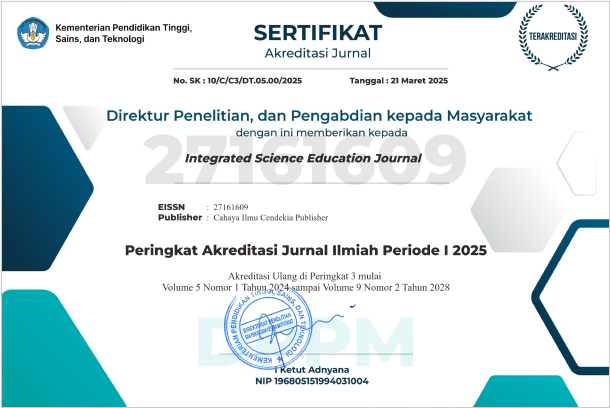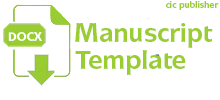Socialization and Training on Making Instruments for Arguing Skills Students in Madrasah Aliyah School
Abstract
Research objectives: The objectives of this study are to introduce and improve teachers' ability in designing student argumentation assessment instruments in measuring students' level of understanding in learning. Ultimately, it will help students develop good and correct argumentation skills during the learning process.
Methodology: The method used in this study is a quantitative method. In using this method, the researcher uses a research design in the form of a questionnaire. By combining this method and design, the research results will be obtained in the form of numbers. The subjects in this study were teachers at Mtss Al-Hidayah. Kebon IX. The results of this study will later become a reference for how this research is conducted and what conclusions can be obtained from the implementation of this research.
Main Findings: In the research related to the implementation and application of argumentation instruments, it was found that more than 50% of teachers agreed to implement this argumentation ability instrument. It is seen that teachers strongly agree with the existence of argumentation ability instruments. Teachers are interested and also want to try the argumentation skills instrument.
Novelty/Originality of this study: This study is rarely conducted and this study is also quite interesting. From the discussion session, there are still many teachers who do not know about the existence of this argumentation ability instrument. Teachers are interested in implementing this argumentation ability instrument not only in science learning, but also in other subjects.
References
R. K Hayati and A. C Utomo, “Development of thematic learning motivation instruments to improve critical thinking skills of elementary school students,” J. Basicedu, vol. 3, no. 2, pp. 524–532, 2020.
R. Tanfiziyah et al., “Profile of students' argumentation ability regarding socioscientific issues in online learning,” vol. 6, no. 1, 2021.
A. Permanasari, “STEM education: Innovation in science learning,” Pros. Semin. Nas. Educ. Science VI, pp. 23–34, 2016.
A. Desstya, “Position and Application of Science Education in Elementary Schools,” Educator Profession. Elementary, vol. 1, no. 2, pp. 193–200, 2016, doi: 10.23917/ppd.v1i2.1002.
S. N. Pratiwi, C. Cari, and N. S. Aminah, “21st century science learning with students’ science literacy,” J. Mater. and Learning, vol. 9, pp. 34–42, 2019, doi: 10.20961/jmpf.v9i1.31612.
V. Dawson, and K. Carson, “Introducing argumentation about climate change socioscientific issues in a disadvantaged school,” Research in Science Education, vol. 50, no. 3, pp. 863-883, 2020.
D. R. F. Harlita and M. Ramli, “Improving students’ argumentation skills through action research with a focus on think pair share action,” vol. 15, no. 1, pp. 253–259, 2018, 10.1007/s11165-018-9715-x.
Y. C. Chen, “Dialogic pathways to manage uncertainty for productive engagement in scientific argumentation: A longitudinal case study grounded in an ethnographic perspective,” Science & Education, vol. 29, no. 2, pp. 331-375, 2020, doi: 10.1007/s11191-020-00111-z.
S. Sushil, and K. K. Dinesh, “Structured literature review with TISM leading to an argumentation based conceptual model,” Global Journal of Flexible Systems Management, 23(3), 387-407, 2022, doi: 10.1007/s40171-022-00309-w.
O. Sengul, P. J. Enderle, and R. S. Schwartz, “Science teachers’ use of argumentation instructional model: linking PCK of argumentation, epistemological beliefs, and practice,” International Journal of Science Education, vol. 42, no. 7, pp. 1068-1086, 2020, doi: 10.1080/09500693.2020.1748250.
A. Baytelman, K. Iordanou, and C. P. Constantinou, “Epistemic beliefs and prior knowledge as predictors of the construction of different types of arguments on socioscientific issues,” Journal of Research in Science Teaching, vol. 57, no. 8, pp. 1199-1227, 2020, doi: 10.1002/tea.21627.
T. Abate, K. Michael, and C. Angell, “Assessment of scientific reasoning: Development and validation of scientific reasoning assessment tool,” Eurasia Journal of Mathematics, Science and Technology Education, vol. 16, no. 12, 2020, doi: 10.29333/ejmste/9353.
R. C. Anderson, E. A. Chaparro, K. Smolkowski, and R. Cameron, “Visual thinking and argumentative writing: A social-cognitive pairing for student writing development,” Assessing writing, vol. 55, pp. 100694, 2023, doi: 10.1016/j.asw.2023.100694.
A. J. Sharon, and A. Baram‐Tsabari, “Can science literacy help individuals identify misinformation in everyday life?,” Science Education, vol. 104, no. 5, pp. 873-894, 2020, doi: 10.1002/sce.21581.
M. T. Wahyunan Widhi, A. R. Hakim, N. I. Wulansari, M. I. Solahuddin, and S. Admoko, “Analisis keterampilan argumentasi ilmiah peserta didik pada model pembelajaran berbasis Toulmin’s Argumentation Pattern (TAP) dalam memahami konsep fisika dengan metode library research [Analysis of students' scientific argumentation skills in the Toulmin's Argumentation Pattern (TAP) based learning model in understanding physics concepts using the library research method]”, pendipa. jurnal. pendik. sains, vol. 5, no. 1, pp. 79–91, 2021, doi: 10.33369/pendipa.5.1.79-91.
K. Wardani and WB Sabtiwan, “Assessment instrument to measure argumentation skills on environmental pollution material,” Pensa E-Jurnal Pendidik. Sains, vol. 11, no. 2, pp. 175–179, 2023.
Y. Su, Y. Lin, and C. Lai, “Collaborating with ChatGPT in argumentative writing classrooms,” Assessing Writing, vol. 57, pp. 100752, 2023, doi: 10.1016/j.asw.2023.100752.
F. N. F. Nisak and N. Suprapto, “Analisis kemampuan argumentasi ilmiah siswa dengan penggunaan media photovoice pada materi pembiasan cahaya [Analysis of students’ scientific argumentation ability using photovoice media on light refraction material],” IPF Inov. Educator. Phys, vol. 11, no. 1, pp. 35–45, 2022, doi: 10.26740/ipf.v11n1.p35-45.
S. Suraya, A. E. Setiadi, and N. D. Muldayanti, “Argumentasi ilmiah dan keterampilan berpikir kritis melalui metode debat [Scientific argumentation and critical thinking skills through debate method],” Edusains, vol. 11, no. 2, pp. 233–241, 2019, doi: 10.15408/es.v11i2.10479.
O. Acar and BR Patton, “Argumentation and formal reasoning skills in an argumentation-based guided inquiry course,” Procedia - Soc. Behav. Sci., vol. 46, no. October, pp. 4756–4760, 2012, doi: 10.1016/j.sbspro.2012.06.331.
V. Viyanti, C. Cari, W. Sunarno, and Z. K. Prasetyo, “Analisis tes argumentasi materi terapung dan tenggelam [Analysis of floating and sinking material argumentation test],” J. Educ. Phys. and Science, vol. 2, no. 2, p. 88, 2016, doi: 10.25273/jpfk.v2i2.700.
N. Siregar and RA Pakpahan, “Kemampuan argumentasi ipa siswa melalui pembelajaran argument driven inquiry (ADI) [Students’ science argumentation ability through ar argumentation driven inquiry (ADI) learning],” vol. 10, no. 2, pp. 94–103, 2020, doi: 10.24929/lensa.v10i2.113.
Z. Matondang, “Validity and Reliability of a Research Instrument,” J. Tabularasa Pps Unimed, vol. 6, no. 1, pp. 87–97, 2009.
W. Wahyudi, “Portfolio-Based Learning Assessment in Schools,” J. Visi Ilmu Pendidik., vol. 2, no. 1, pp. 288–297, 2012, doi: 10.26418/jvip.v2i1.370.
B. I Sappaile, “The Concept of Educational Research Instruments,” Educator. and Culture., vol. 066, 2007.
F. Roshayanti, “The Quality of Students' Written Argumentation on the Concept of Human Physiology Based on AASSC,” pp. 64–75.
A. Suharsimi, “Quantitative Research Procedures,” vol. 2, no. 3, pp. 211–213, 2010.
A. G. Prawiyogi, T. L. Sadiah, A. Purwanugraha, and P. N. Elisa, “Using Big Book Media to Cultivate Students’ Reading Interest in Elementary Schools,” J. Basicedu, vol. 5, no. 5, pp. 3(2), 524–532, 2020.
M. Nashrullah and E. F. Fahyuni, N. Nurdyansyah, and RS Untari, Educational Research Methodology (Research Procedures, Research Subjects, and Development of Data Collection Techniques). 2023. doi: 10.21070/2023/978-623-464-071-7.
J. Caron and J. R. Markusen, Development of Questionnaire Instrument. 2016.
N. M. Agusti and A. Aslam, “Effectiveness of wordwall application learning media on science learning outcomes of elementary school students,” J. Basicedu, vol. 6, no. 4, pp. 5794–5800, 2022, doi: 10.31004/basicedu.v6i4.3053.
Copyright (c) 2024 Yusnidar Yusnidar, Harizon Harizon, Haryanto Haryanto, Astalini Astalini, Darmaji Darmaji, Sri Suryati, Gita Salsabilla Nurma Yahya

This work is licensed under a Creative Commons Attribution 4.0 International License.
Authors who publish with this journal agree to the following terms:
- Authors retain copyright and acknowledge that the Integrated Science Education Journal is the first publisher licensed under a Creative Commons Attribution 4.0 International License.
- Authors are able to enter into separate, additional contractual arrangements for the non-exclusive distribution of the journal's published version of the work (e.g., post it to an institutional repository or publish it in a book), with an acknowledgment of its initial publication in this journal.
- Authors are permitted and encouraged to post their work online (e.g., in institutional repositories or on their website) prior to and during the submission process, as it can lead to productive exchanges and earlier and greater citation of published work.







.png)
.png)






